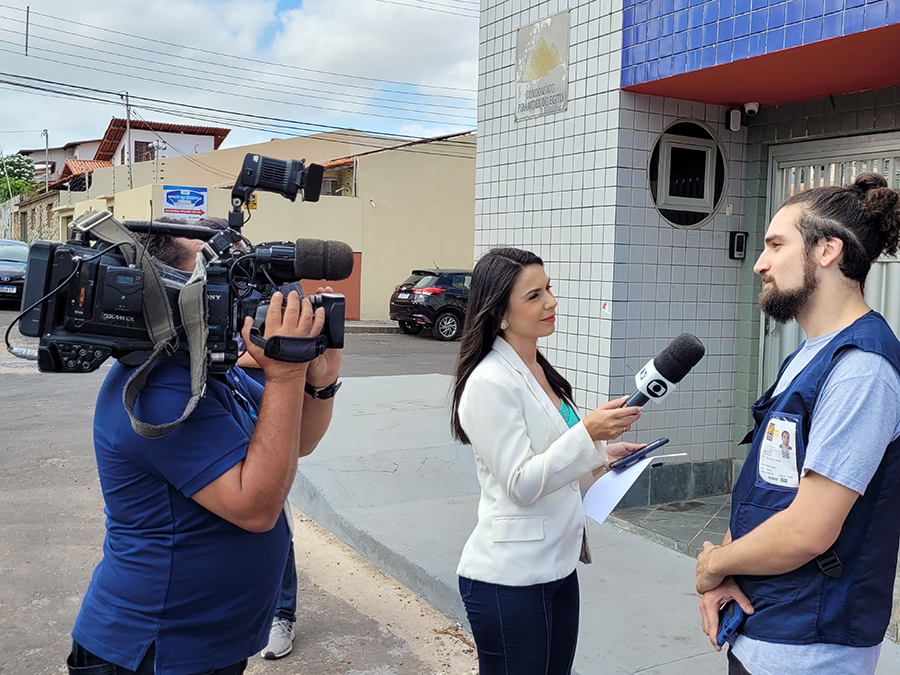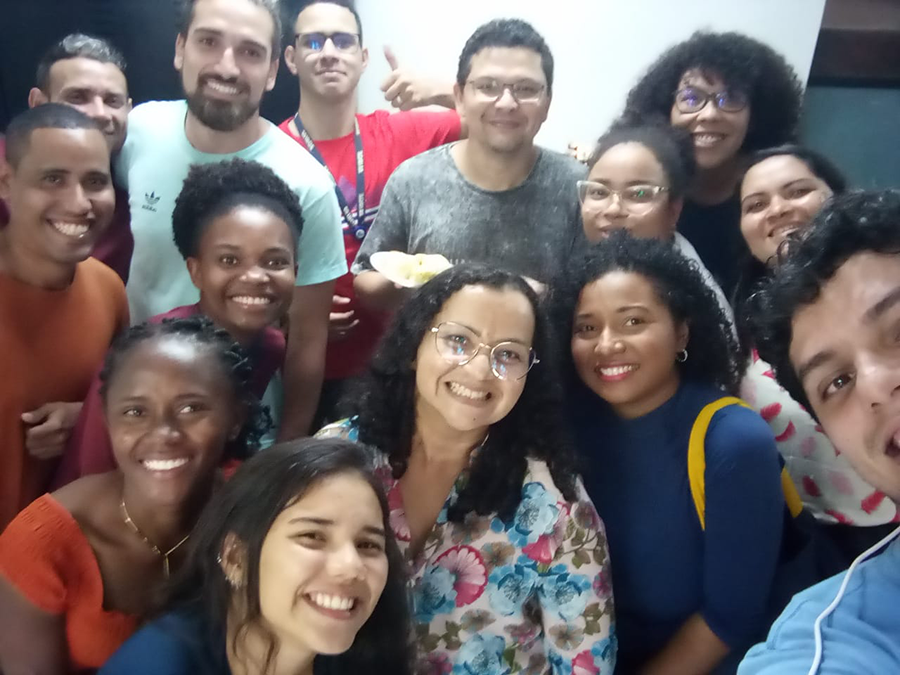SES-MA – Census agents report their work experiences in the Population Census
April 28, 2023 17h08 | Last Updated: May 08, 2023 16h53
The 2022 Population Census is in its final stretch in Maranhão. For months, teams worked hard and strived for covering a territory with more than 329 thousand km2 with a wide geographic, social and cultural diversity.
Along the way, it is possible to highlight some characters who overcame their limits to carry out the Census smoothly. As Census temporary workers, enumerators, census agents, sub-area coordinators and census analysts struggled to solve natural challenges of such a huge operation. It is impossible to describe all the characters in detail, yet it is possible to highlight some life journeys in the Census that can illustrate such a saga.
The history of the youngest enumerator in Maranhão, Maria Eduarda Castro or Duda for her intimate friends, who enrolled in the selection process when she was only 17 years old. She works as an enumerator since the beginning of the census operation (then she was 18 years old). This is her first job and she insists on highlighting such experience: “I never imagined to know so many people, so many places and so many different realities.”
During eight months in the field she had a number of experiences which made her reflect a lot and feel mixed emotions. She highlights the major ones: areas in poor communities without basic sanitation, bitten by a dog while she covered areas of stilt houses and ignored by several informants. In spite of the difficulties, she stood her ground and insisted on carrying out the interviews, usually returning in different hours to meet the residents, working at night and in the weekends. A major difficulty reported was the access to condominiums in affluent areas, as well as the high number of refusals from higher-class people. Castro is stationed in the São Francisco data collection station, a station surrounded by a large number of condominiums.

Maria Eduarda Castro interviewing for the Census
Despite the huge difficulties in higher-class areas, she met “amazing people, gentle people who offered water, snacks and even lunch, people who insisted on answering the Census and being counted, people who understood that it wasn´t an easy task and that I was there everyday to do my job regardless of hours, weather and week day,”
The field work allowed her to significantly visualize the social gap existing in society. She reports to have worked in two close areas, one comprising luxury condominiums with one apartment per floor and six bathrooms and the other comprising houses on the mangrove without bathrooms and piped water. “Covering the two areas in the same day was like a shock to me, I always felt mixed emotions and I thought I would never meet such completely opposite realities.”
Castro was one of the 42 persons sent from Maranhão to help the census work in Espírito Santo. She states that “it was one of the best experiences in my life for sure.”
Castro is the most productive enumerator in Maranhão. She says that her success is due to “the amazing team of my data collection station, that always helped me and supported me whenever I thought in giving it up.” She says that she could´t make it without such support and that she created bonds she will keep after the Census. I never imagined to create bonds with these people, but today I feel they are part of my life and helped to advance in my journey in the IBGE. Castro loved her work in the IBGE to the point that she intends to join the IBGE as an effective servant to “remain in this institution that made me learn a lot.”
Another interesting report of this big puzzle comprising census teams can be illustrated by municipal census agent Gustavo Alves Coutinho. He is 29 years old and lived in São Paulo, yet he chose to work in the census operation in the municipality of São Luís. He reports the following on his choice: I chose to work in the census in another state, aiming at knowing that place from the IBGE´s perspective, and I assure that it was one of the best experiences I had in my life.
Coutinho states that he dealt with the complexity of the data collection station he is stationed (São Francisco station), which portrays very well what Brazil is, where higher-class residences are located, as well as poor places in terms of life conditions.
He arrived in the city without knowing anyone, managed to rent a house in the historic center and to manage the São Francisco data collection station, located in the same building as the São Luís branch and where the dissemination sector of SES-MA is. Due to the proximity with the dissemination sector and to the fact that his area faces different situations - higher-class condominiums and very poor communities -, it was usual that he and his team help dissemination actions with communication vehicles. On this experience, he reports: “all of a sudden we are on TV every week, hosting several important persons, material coming from the entire country, I was feeling this huge operation which is the Census.”

ACM Gustavo Coutinho interviewed by TV Mirante
Coutinho highlights the challenge of learning how to manage a complex station and, at the same time, knowing completely different realities. He states that he was lucky for working with honest and skilled people. He reminds the first meeting with the ACS team, in which “an agreement that that work was a unique learning opportunity in our personal and professional life” was established.
A major challenge was the big number of enumerators continuously arriving and always looking for explanations. In these cases, the supervisor census agents team jointly looked for the best solution. Concerning the problems, Coutinho reports that they were many, from cases of segregation in condominiums to personal situations reported to me.
He considers that that there is a knowledge exchange between census agents and enumerators, because a lot is learned with those who were in the field. For him, “enumerators are the most important piece in the Census, as they are the face of our institution and so they needed all the support.”
Like Castro, a highlight in his census journey was to contribute with the operation in Espírito Santo, where he had the opportunity to work with people from his team and census agents from other cities. After ten months he is closing his work as a municipal census agent. He will take many friends he made and many memories that are now part of his history.
He closed his report stating that “for those who want to know Brazil, the IBGE is a great opportunity, as it comprises people who aim at portraying the truth of our country.”
The two characters are very helpful persons and always helped to disseminate the census operation through the communication vehicles. Therefore, as the person in charge of this area in Maranhão, I take this time to thank both of them, as well as the other temporary servants who struggled to the success of the Population Census.
These two stories are a small illustration of the work that thousands of temporary servants did for the Population Census in Maranhão.

São Francisco station team with Area Coordinator Elcylene Mendes (center) saying goodbye to ACM Gustavo Coutinho on April 27, 2023
